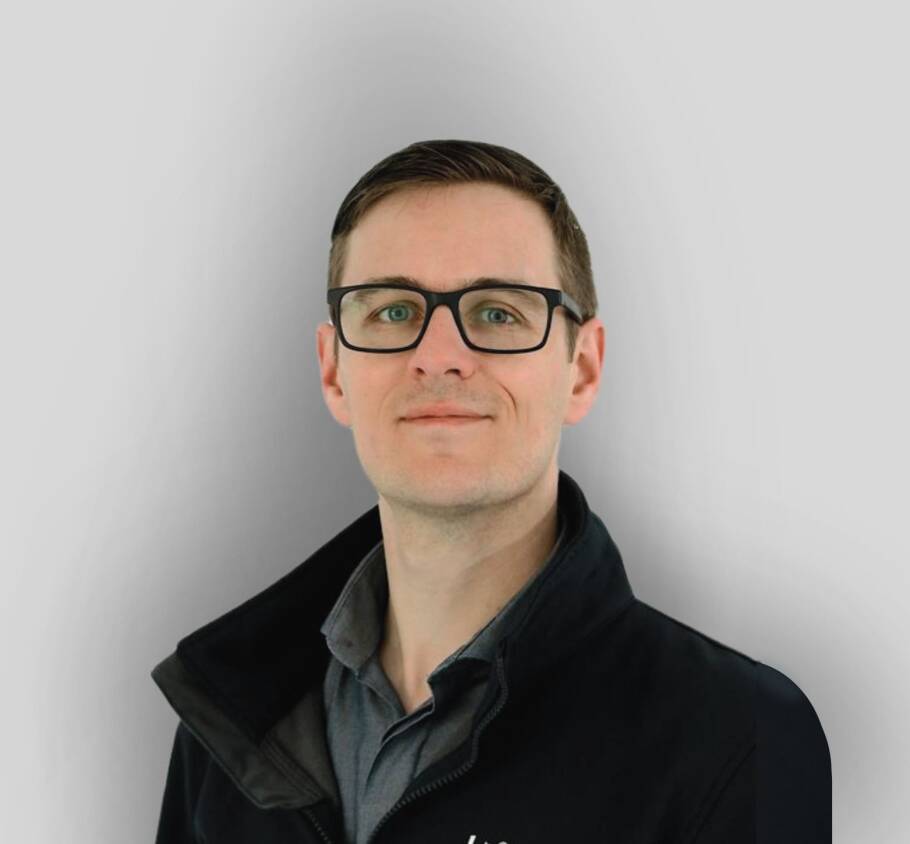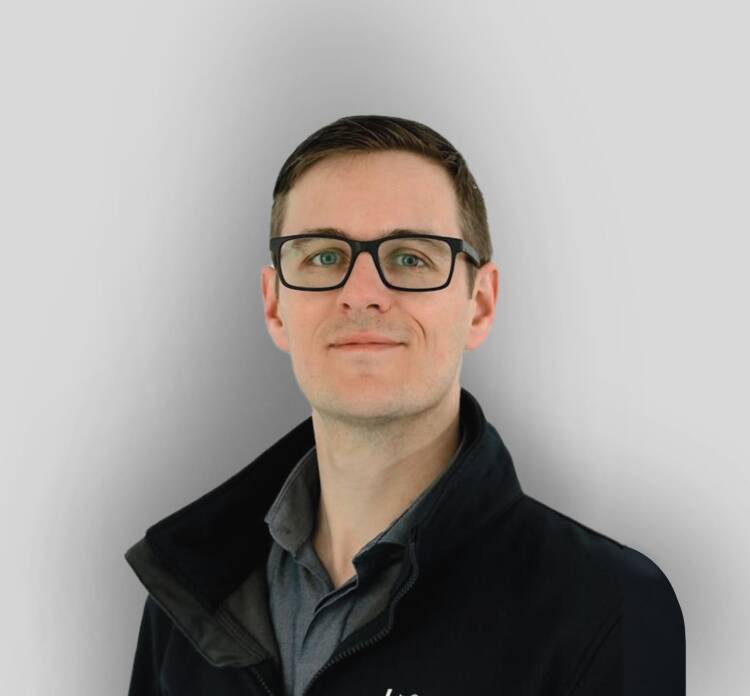Dr Lloyd Fletcher works in the Fusion Technology division at the Fusion Technology Facility (FTF), Rotherham. In July 2024, he was awarded a prestigious UKRI Future Leaders Fellowship, focused on developing a Computer Aided Validation Framework for Digital Design Qualification. Lloyd is also a Visiting Lecturer at the University of Sheffield.
Can you tell us a bit about yourself and your role at UKAEA and how it has evolved over time?
Originally, my role focused on maximising value from large-scale, expensive experiments—essentially delivering the most impact per test. Now, with the UKRI fellowship, my focus has shifted. While I’m funded by UKAEA, my performance is measured by how effectively I deliver the fellowship outcomes.
The fellowship supports the second part of UKAEA’s mission: maximising scientific and economic benefit. A lot of the methodologies I develop for fusion experiments can be applied to other high-tech sectors, like Rolls-Royce for turbofan testing or Airbus for structural wing trials. I’m passionate about refining engineering methodologies and creating value not just for fusion, but for UK industry more broadly.
Congratulations on the Future Leaders Fellowship! What was the application experience like?
The application process is long and quite intense. Fellowships are unique - you’re not just pitching a project; you’re selling your vision and your capacity to lead it. The reviewers want to know: Are you the right person to champion this work? Can you build a community around the idea?
That makes the outcome feel personal. If you fail, it stings more than a regular grant. So I was ecstatic to receive it, and now I’m focused on making the most of this opportunity. It’s a platform you can build an entire career on.
What are you and your team currently working on?
We’re developing an open-source software tool to help engineers design better experiments. While we already have great physics simulation tools, real-world experiments involve sensors - devices that don't perfectly reflect reality.
The fellowship’s goal is to simulate how sensors filter what they "see," so engineers can account for those limitations in advance. Our tool will let users create virtual laboratories where they can place simulated sensors into a physics model, experiment digitally, and optimise setups before committing to expensive physical trials, such as those run on CHIMERA.
That means fewer trial-and-error cycles, better data on the first try, and potentially major cost savings.
Where is your team based, and how is it structured?
We’re based across FTF in South Yorkshire and Culham. One of the core ideas I pitched to UKRI was this: I’m an experimentalist entering the world of software engineering. And there’s often a disconnect between those two.
We’re blending disciplines. I’ve hired software engineers and am training them in experimental methods, while also supporting experimentalists in learning to write software. It’s about developing a hybrid skillset that can navigate both physical and digital domains. That’s quite rare and incredibly valuable.
Currently, I have two software engineers on the team. Soon, I’ll be adding two graduates who will be trained under this new engineering model.
What are the biggest challenges you face delivering your work?
The key challenge is staying laser-focused on creating something with real-world impact, quickly. Industry doesn’t want a conceptual idea; they want working solutions. My goal is to get our software to a point where I can take an industry simulation and demonstrate results immediately.
I’m aiming to deliver a minimum viable product as soon as possible - something simple, effective, and scalable—rather than trying to perfect every feature before we’ve made an impact.
What do you enjoy most about working at Fusion Technology Facility (FTF)?
FTF’s biggest strength is the people — and the collaborative, cross-disciplinary culture. It’s a small, dynamic community where we constantly exchange ideas, and that sparks innovation. Fusion demands every discipline of science and engineering, so working across boundaries is essential.
I also really appreciate the culture of openness at UKAEA. People feel comfortable saying, “I don’t know,” and asking for context. It’s an environment where expertise is respected, but collaboration is what drives progress. That mindset really sets us apart.
What impact do you hope your fellowship will have on UKAEA and the wider fusion industry?
I hope my fellowship will provide us with new engineering methods that will enable us to reduce the amount of testing required to make fusion engineering components a commercial reality. This reduced testing means less waste while increasing reliability and safety. I think the wider fusion industry has strong incentives to adopt new engineering methods, as the environments that components are required to withstand are unique.
Any advice for others thinking of applying for a Future Leaders Fellowship?
There are two key pieces of advice I can give to people who want to apply for fellowships. The first is not to be afraid to fail and to believe in yourself and start applying - I failed many times before getting my first fellowship, and many of my mentors, who are researchers I have a lot of respect for, have failed many times as well. Every time you do fail, you learn and improve, building your own unique and persuasive grant writing style. Which brings me to my second piece of advice. Having a good range of mentors is key, no matter what career path you take - for fellowships, you want mentors who have won fellowships and know the process, but are also good at building your confidence and bringing it back when you do fail.

Spotlight Interview: Dr Lloyd Fletcher
Spotlight Interview: Dr Lloyd Fletcher
Dr Lloyd Fletcher works in the Fusion Technology division at the Fusion Technology Facility (FTF), Rotherham. In July 2024, he was awarded a prestigious UKRI Future Leaders Fellowship, focused on developing a Computer Aided Validation Framework for Digital Design Qualification. Lloyd is also a Visiting Lecturer at the University of Sheffield.
Can you tell us a bit about yourself and your role at UKAEA and how it has evolved over time?
Originally, my role focused on maximising value from large-scale, expensive experiments—essentially delivering the most impact per test. Now, with the UKRI fellowship, my focus has shifted. While I’m funded by UKAEA, my performance is measured by how effectively I deliver the fellowship outcomes.
The fellowship supports the second part of UKAEA’s mission: maximising scientific and economic benefit. A lot of the methodologies I develop for fusion experiments can be applied to other high-tech sectors, like Rolls-Royce for turbofan testing or Airbus for structural wing trials. I’m passionate about refining engineering methodologies and creating value not just for fusion, but for UK industry more broadly.
Congratulations on the Future Leaders Fellowship! What was the application experience like?
The application process is long and quite intense. Fellowships are unique - you’re not just pitching a project; you’re selling your vision and your capacity to lead it. The reviewers want to know: Are you the right person to champion this work? Can you build a community around the idea?
That makes the outcome feel personal. If you fail, it stings more than a regular grant. So I was ecstatic to receive it, and now I’m focused on making the most of this opportunity. It’s a platform you can build an entire career on.
What are you and your team currently working on?
We’re developing an open-source software tool to help engineers design better experiments. While we already have great physics simulation tools, real-world experiments involve sensors - devices that don't perfectly reflect reality.
The fellowship’s goal is to simulate how sensors filter what they "see," so engineers can account for those limitations in advance. Our tool will let users create virtual laboratories where they can place simulated sensors into a physics model, experiment digitally, and optimise setups before committing to expensive physical trials, such as those run on CHIMERA.
That means fewer trial-and-error cycles, better data on the first try, and potentially major cost savings.
Where is your team based, and how is it structured?
We’re based across FTF in South Yorkshire and Culham. One of the core ideas I pitched to UKRI was this: I’m an experimentalist entering the world of software engineering. And there’s often a disconnect between those two.
We’re blending disciplines. I’ve hired software engineers and am training them in experimental methods, while also supporting experimentalists in learning to write software. It’s about developing a hybrid skillset that can navigate both physical and digital domains. That’s quite rare and incredibly valuable.
Currently, I have two software engineers on the team. Soon, I’ll be adding two graduates who will be trained under this new engineering model.
What are the biggest challenges you face delivering your work?
The key challenge is staying laser-focused on creating something with real-world impact, quickly. Industry doesn’t want a conceptual idea; they want working solutions. My goal is to get our software to a point where I can take an industry simulation and demonstrate results immediately.
I’m aiming to deliver a minimum viable product as soon as possible - something simple, effective, and scalable—rather than trying to perfect every feature before we’ve made an impact.
What do you enjoy most about working at Fusion Technology Facility (FTF)?
FTF’s biggest strength is the people — and the collaborative, cross-disciplinary culture. It’s a small, dynamic community where we constantly exchange ideas, and that sparks innovation. Fusion demands every discipline of science and engineering, so working across boundaries is essential.
I also really appreciate the culture of openness at UKAEA. People feel comfortable saying, “I don’t know,” and asking for context. It’s an environment where expertise is respected, but collaboration is what drives progress. That mindset really sets us apart.
What impact do you hope your fellowship will have on UKAEA and the wider fusion industry?
I hope my fellowship will provide us with new engineering methods that will enable us to reduce the amount of testing required to make fusion engineering components a commercial reality. This reduced testing means less waste while increasing reliability and safety. I think the wider fusion industry has strong incentives to adopt new engineering methods, as the environments that components are required to withstand are unique.
Any advice for others thinking of applying for a Future Leaders Fellowship?
There are two key pieces of advice I can give to people who want to apply for fellowships. The first is not to be afraid to fail and to believe in yourself and start applying - I failed many times before getting my first fellowship, and many of my mentors, who are researchers I have a lot of respect for, have failed many times as well. Every time you do fail, you learn and improve, building your own unique and persuasive grant writing style. Which brings me to my second piece of advice. Having a good range of mentors is key, no matter what career path you take - for fellowships, you want mentors who have won fellowships and know the process, but are also good at building your confidence and bringing it back when you do fail.
